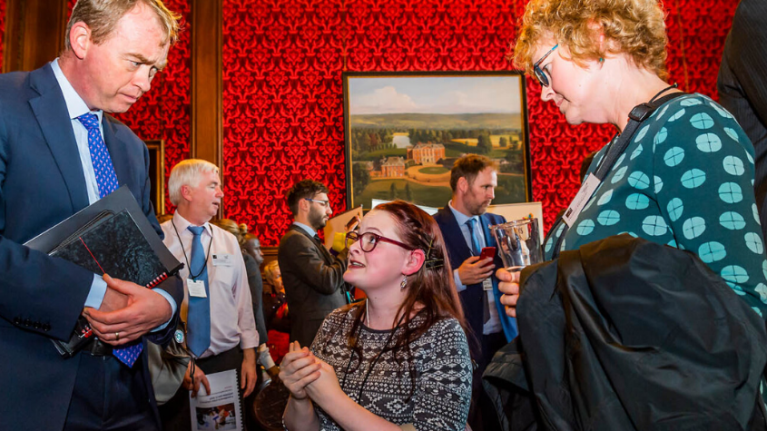
On 21 October, Together for Short Lives launched a report which revealed a growing shortage of skilled children’s palliative care doctors and nurses across England. We described the knock-on effect this is having for seriously ill children and their families, who are missing out on crucial out of hours care and vital short respite breaks. The day after, the All-Party Parliamentary Group (APPG) for Children Who Need Palliative Care hosted a reception in the House of Commons to ask MPs and peers to work with the government to end the crisis. Hannah Hodgson, 21, who has been diagnosed with Elhers Danlos Syndrome and a currently unnamed degenerative neuromuscular disorder, attended the reception to share her story with MPs – and to press them to take action. Hannah has shared her experience of the day below.
I have been in the system of palliative care since I was 16 – so over the last five years I have experienced both children’s and adult services. Staffing is a chronic problem. The hospice I’m at currently has had to close unexpectedly due to a lack of applicants for the senior palliative care doctor post. This has meant that respite for families like mine is now in huge jeopardy, while specialist end of life care is provided in people’s homes. In my experience, the staff working in hospices couldn’t be more dedicated – they are expected to do more for less constantly – and still provide the essential services. However, this isn’t fair for patients or staff because it removes choice at such a tender and devastating period of people’s lives.
As I said to those I talked with at the APPG reception, it isn’t the people that are the issue – it is the lack of both the financial and educational incentives to become a palliative care doctor (and to live somewhere very rural, in the case of my hospice). These posts and hospices themselves are hugely essential to those who use them. If you’re using a hospice you can’t get much more unwell – and I personally believe this is the crux of the issue.
Putting faces and real stories behind figures (as was portrayed by Gail Bedding, a parent who gave an incredible speech at the reception), will help to bring about change. I believe it’s easy to disassociate from facts and figures if you don’t have an ill child, because you cannot (and don’t want to, as it’s distressing) imagine what a child and their family are going through behind closed doors. Another thing about these families is that we are often stoic. When we ask for help, we are desperate. It’s easy to mistake stoicism and a wish to make the most of things as coping. I know that for my mum and I, we put our makeup on, and everyone thinks we are fine. No one sees that after the meeting I stand up too quickly and black out. Nobody hears the nights I sob about a world I feel has been pitted against me. This is one of many reasons why funding and workplace shortages are such huge issues in palliative care.
It was a great experience to be able to tell my story, and those of my friends, while at this reception. It brought everything home to me, that my family must keep pushing on to get the extra care I need. Off the back of this event I have found the courage to battle with my local clinical commissioning group and they have now approved additional hours and a permanent contract for my carer. This 20 hours a week is going to be revolutionary – as well as looking after me, it gives an opportunity to my mum, who has additional responsibilities running the household, to resume the hobbies and friendships she has had to abandon. I would like to thank both Together for Short Lives and the MPs present for allowing me to share my experiences and for being such avid listeners. Together, I know these much needed changes need to happen.
Feeling inspired by Hannah’s story? Young people with life-limiting conditions can play a crucial role in battling for better palliative care. Meeting your local MP and telling them how they can help can make a huge difference, both to yourself and others. Get in touch with your local MP after the general election and ask them to meet you at one of their local constituency surgeries. They might be able to help you resolve any challenges you are facing with your local NHS organisations or local authorities – and, crucially, work with the government to improve access to palliative care for children, young people and families right across England.

